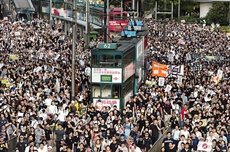Protests against Chinese hegemony paralyse Hong Kong
29 Sep 2014
Thousands of pro-democracy protesters started blocking major highways in the heart of Hong Kong overnight today, defying government attempts to force or cajole them into giving up their demonstration.
 The protests have brought widespread disruption to the heart of one of Asia's biggest financial centres, blocking traffic on multi-lane roads and prompting the suspension of school classes.
The protests have brought widespread disruption to the heart of one of Asia's biggest financial centres, blocking traffic on multi-lane roads and prompting the suspension of school classes.
A police crackdown on demonstrators on Sunday - involving tear gas, batons and pepper spray - resulted in clashes that injured more than 40 people but failed to eject the protesters from their positions among the city's glittering skyscrapers.
The government adopted a more conciliatory approach today, saying it had withdrawn riot police from the protest areas. It urged people to disperse and allow traffic to return to the roads. But the protesters, rallying against what many see as the growing influence of the Chinese Communist Party on the way Hong Kong is run, are so far refusing to budge.
Demonstrators are angry at China's decision to allow only Beijing-vetted candidates to stand in the city's elections for chief executive in 2017. (See: Protests erupt in Hong Kong as Beijing breaks promise of free polls).
The protesters say Beijing has gone back on its pledge to allow universal suffrage in Hong Kong, which was promised "a high degree of autonomy" when it was handed back to China by Britain in 1997.
Police used pepper spray and tear gas against demonstrators on Sunday. The protests, which have seen thousands of students in their teens and 20s take to the streets, swelled in size over the weekend.
The protesters are responding to China's decision to allow only Beijing-vetted candidates to stand in the city's election in 2017 for chief executive, Hong Kong's top civil position.
Hong Kong was promised "a high degree of autonomy" when it was handed back to China by Britain in 1997.
The large-scale demonstrations now taking place grew out of student-led boycotts and protests that began last week. The demonstrations increased in size over the weekend after gaining the support of Occupy Central with Love and Peace, a protest group that was already planning to lead a campaign of civil disobedience later this week.
Images of heavy-handed treatment of protesters by police shocked many residents of Hong Kong, where large-scale, peaceful protests are common, but police crackdowns are relatively rare.


















